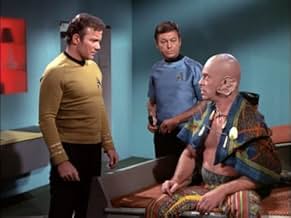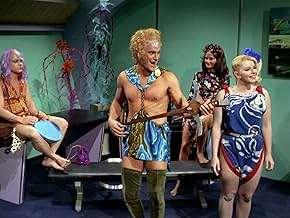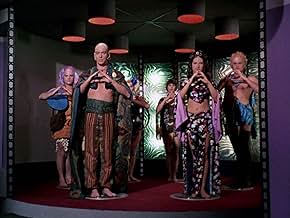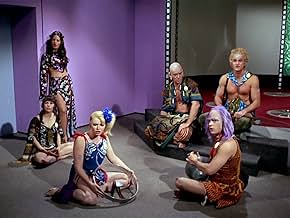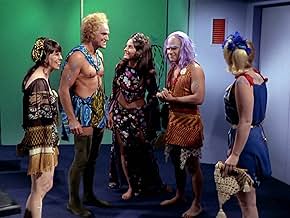The Way to Eden
- Episode aired Feb 21, 1969
- TV-PG
- 51m
IMDb RATING
5.4/10
3.8K
YOUR RATING
A group of idealistic hippies, led by an irrational leader, come aboard the U.S.S. Enterprise.A group of idealistic hippies, led by an irrational leader, come aboard the U.S.S. Enterprise.A group of idealistic hippies, led by an irrational leader, come aboard the U.S.S. Enterprise.
Mary Linda Rapelye
- Irina
- (as Mary-Linda Rapelye)
Bill Blackburn
- Lieutenant Hadley
- (uncredited)
Frank da Vinci
- Lt. Brent
- (uncredited)
James Drake
- Sick-Bay Intern
- (uncredited)
Roger Holloway
- Lt. Lemli
- (uncredited)
Featured reviews
A previous reviewer wrote that Roddenberry was influenced by Woodstock for this episode; however, this couldn't possibly be the case.
This episode originally aired on February 21, 1969; Woodstock took place between August 15 and 18 in 1969.
Otherwise, this is not one of the best episodes of the series (much of Season 3 wasn't good due to a number of reasons, not the least of which was network interference and the downgraded role Roddenberry was allowed to have).
This episode originally aired on February 21, 1969; Woodstock took place between August 15 and 18 in 1969.
Otherwise, this is not one of the best episodes of the series (much of Season 3 wasn't good due to a number of reasons, not the least of which was network interference and the downgraded role Roddenberry was allowed to have).
I agree with other reviewers that this is a poor example of original Star Trek, but for different reasons. It's quite clear that the scriptwriters or producers were hostile to the youth culture movement of the day. The ridiculous way the space hippie tribe is depicted make them little more than a caricature. Worse, they are shown exhibiting all the behaviour of cult members. This is hardly what the hippie movement was about. Most were just looking for a way to reconnect with the planet. Here they are shown as delusional and even dangerous, which of course is the way authorities saw them in the '60s.
Fortunately the scriptwriters make Spock an excellent foil to this all-out hostility toward anyone who questions authority. (Was that Roddenberry's contribution?) If there's a redeeming quality to this episode, it's Nimoy's performance. That the most logical mind in the universe could fully understand the urge to find a way to create a better society proves it's hardly a delusional concept. How else does the human species progress, but by striving for better? Ignore the snarls of the social Darwinists. They just want excuses for their bad behaviour.
In reality there were many complex social factors that created the ferment that was the 1960s —a protracted, bloody war; a suddenly booming economy; higher education for the masses for the first time in history; an incredible explosion of creative genius in most of the arts; racial tensions; emerging gender equality, etc. etc. etc. To oversimplify the stated aims or visions of such a generation is to do them a grave injustice. To depict them as foolish, deluded children is just plain ignorant.
After all, Roddenberry pushed the envelope from the very start of Star Trek. That was hardly establishment thinking. In his own modest way he was as much a part of the social changes sweeping society as any of the other change agents. For a start, he showed women as capable, professional, highly competent and intelligent—besides being sexy. Just look at what else was being made in television and film at the same time and see how many shows you can say that about. I mean, besides Rod Serling and The Twilight Zone.
So as songwriter Nick Lowe once said, "What's so funny about peace, love and understanding?" Is it attainable? Who knows? Probably not. Does that mean we stop trying? "A man's reach must exceed his grasp or what's a heaven for," the poet Browning reminds us. Which is precisely what Roddenberry's Star Trek was all about. Reaching further. Either Roddenberry stumbled on this one, or Heineman had a bad hair day. Or the producers just didn't get it.
Fortunately the scriptwriters make Spock an excellent foil to this all-out hostility toward anyone who questions authority. (Was that Roddenberry's contribution?) If there's a redeeming quality to this episode, it's Nimoy's performance. That the most logical mind in the universe could fully understand the urge to find a way to create a better society proves it's hardly a delusional concept. How else does the human species progress, but by striving for better? Ignore the snarls of the social Darwinists. They just want excuses for their bad behaviour.
In reality there were many complex social factors that created the ferment that was the 1960s —a protracted, bloody war; a suddenly booming economy; higher education for the masses for the first time in history; an incredible explosion of creative genius in most of the arts; racial tensions; emerging gender equality, etc. etc. etc. To oversimplify the stated aims or visions of such a generation is to do them a grave injustice. To depict them as foolish, deluded children is just plain ignorant.
After all, Roddenberry pushed the envelope from the very start of Star Trek. That was hardly establishment thinking. In his own modest way he was as much a part of the social changes sweeping society as any of the other change agents. For a start, he showed women as capable, professional, highly competent and intelligent—besides being sexy. Just look at what else was being made in television and film at the same time and see how many shows you can say that about. I mean, besides Rod Serling and The Twilight Zone.
So as songwriter Nick Lowe once said, "What's so funny about peace, love and understanding?" Is it attainable? Who knows? Probably not. Does that mean we stop trying? "A man's reach must exceed his grasp or what's a heaven for," the poet Browning reminds us. Which is precisely what Roddenberry's Star Trek was all about. Reaching further. Either Roddenberry stumbled on this one, or Heineman had a bad hair day. Or the producers just didn't get it.
This is far down on my list of Star Trek episodes, but I think it gets too much scorn. Actually , I think it is one of the funnier episodes of the Original series. I especially get a kick out of Charles Napier's Adam. I'm not sure if the episode was supposed to be funny, but it is. There are certainly much worse episodes- bleak and nonsensical episodes like "the Empath" or " the Paradise syndrome". If you don't take it too seriously, it is a moderately fun episode. It is also interesting as a social commentary on the times the show was being made.
It surprises me that this is the lowest rated episode of Star Trek TOS. Granted it is silly, but at least it has some laughs. The worst episodes are just boring.
It surprises me that this is the lowest rated episode of Star Trek TOS. Granted it is silly, but at least it has some laughs. The worst episodes are just boring.
I've been struggling to make up my mind: is The Way To Eden the worst Star Trek episode of them all or the greatest piece of camp sci-fi TV ever? Actually, it's both!
Six occupants of a stolen spacecruiser are beamed aboard the Enterprise, and Kirk and his crew are in for a surprise: the new arrivals are members of Dr. Sevrin's hippie cult, who are in search of the legendary planet Eden. During their stay on the ship, they attempt to recruit new followers, stage a sit-down protest at their treatment by 'Herbert' Captain Kirk, and put on impromptu musical performances. Spock, who is intrigued by their counter culture, partakes in a jam session with his harp.
However, when Kirk refuses to go in search of Eden, Sevrin (Skip Homeier) and his hippies stage a coup and take the Enterprise into Romulan territory...
Ridiculous space-hippie lingo, awful flower power pop songs (written and performed by Charles Napier), and silly costumes make The Way To Eden very difficult to forget, try as you might. Those in the mood for something incredibly silly will find much to enjoy here, but anyone expecting a thought provoking piece of intelligent sci-fi will be sorely disappointed.
5.5/10, rounded up to 6 for lovely Mary Linda Rapelye as Chekov's old flame Irina, once a member of Starfleet Academy, now a hippie babe.
Six occupants of a stolen spacecruiser are beamed aboard the Enterprise, and Kirk and his crew are in for a surprise: the new arrivals are members of Dr. Sevrin's hippie cult, who are in search of the legendary planet Eden. During their stay on the ship, they attempt to recruit new followers, stage a sit-down protest at their treatment by 'Herbert' Captain Kirk, and put on impromptu musical performances. Spock, who is intrigued by their counter culture, partakes in a jam session with his harp.
However, when Kirk refuses to go in search of Eden, Sevrin (Skip Homeier) and his hippies stage a coup and take the Enterprise into Romulan territory...
Ridiculous space-hippie lingo, awful flower power pop songs (written and performed by Charles Napier), and silly costumes make The Way To Eden very difficult to forget, try as you might. Those in the mood for something incredibly silly will find much to enjoy here, but anyone expecting a thought provoking piece of intelligent sci-fi will be sorely disappointed.
5.5/10, rounded up to 6 for lovely Mary Linda Rapelye as Chekov's old flame Irina, once a member of Starfleet Academy, now a hippie babe.
Hijacked by a pair of cauliflower ears, the Enterprise is taken by a group who have no fears, by singers and dancers, hippy-like prancers, to a planet called Eden but no paradise appears.
It's a tough swallow, especially at the end, and flower power doesn't save the day.
It's a tough swallow, especially at the end, and flower power doesn't save the day.
Did you know
- TriviaFor the scene in which Spock plays his Vulcan harp for Adam (the last time he plays the instrument on the series), the background music for Uhura's song from Charlie X (1966) is recycled.
- GoofsTwo times, a shot of Kirk is reversed (presumably to make him face the right side of the screen) The first time he is facing Sulu in a corridor of the Enterprise, the second he is looking where Dr. Sevrin had just run on the planet Eden. Note the appearance of the Star Fleet emblem on the right side of his shirt, rather than the usual left side.
- Alternate versionsSpecial Enhanced version Digitally Remastered with new exterior shots and remade opening theme song
- ConnectionsEdited from Star Trek: Spock's Brain (1968)
- SoundtracksHey, Out There!
Written by Charles Napier and Craig Robertson
Lyrics by Arthur Heinemann
Performed by Charles Napier and Deborah Downey
Details
- Release date
- Country of origin
- Official sites
- Languages
- Filming locations
- Yosemite Valley, Yosemite National Park, California, USA(Planet Eden - stock footage added to the Remastered version)
- Production companies
- See more company credits at IMDbPro
Contribute to this page
Suggest an edit or add missing content


